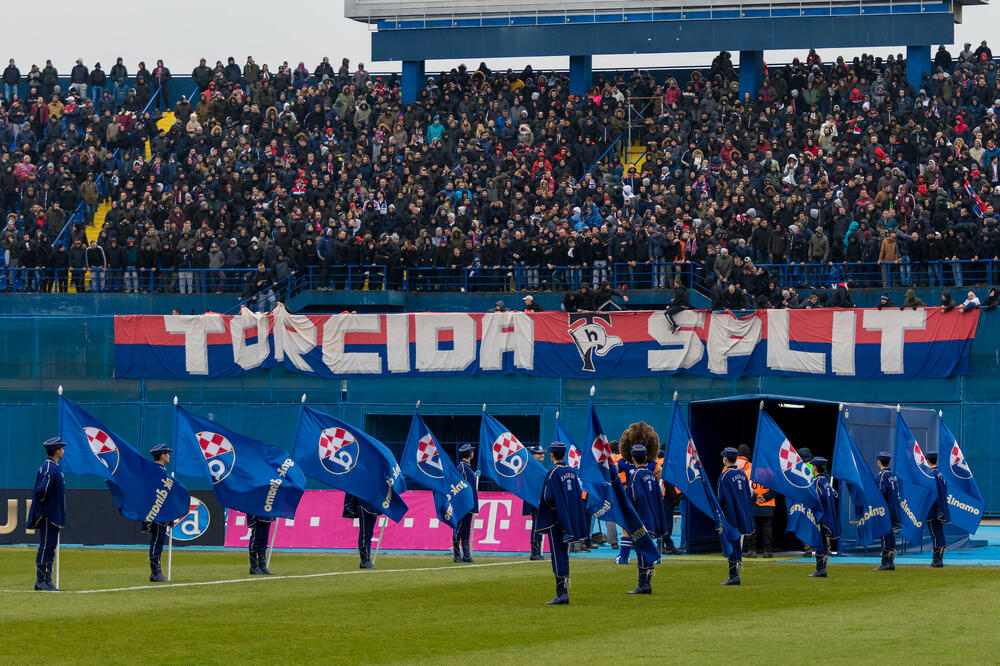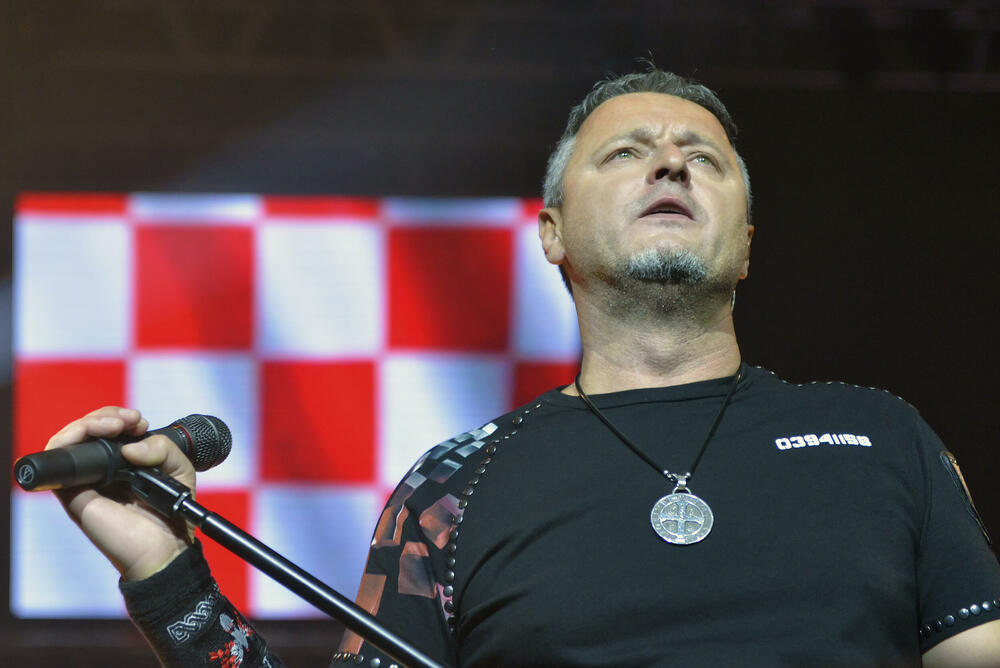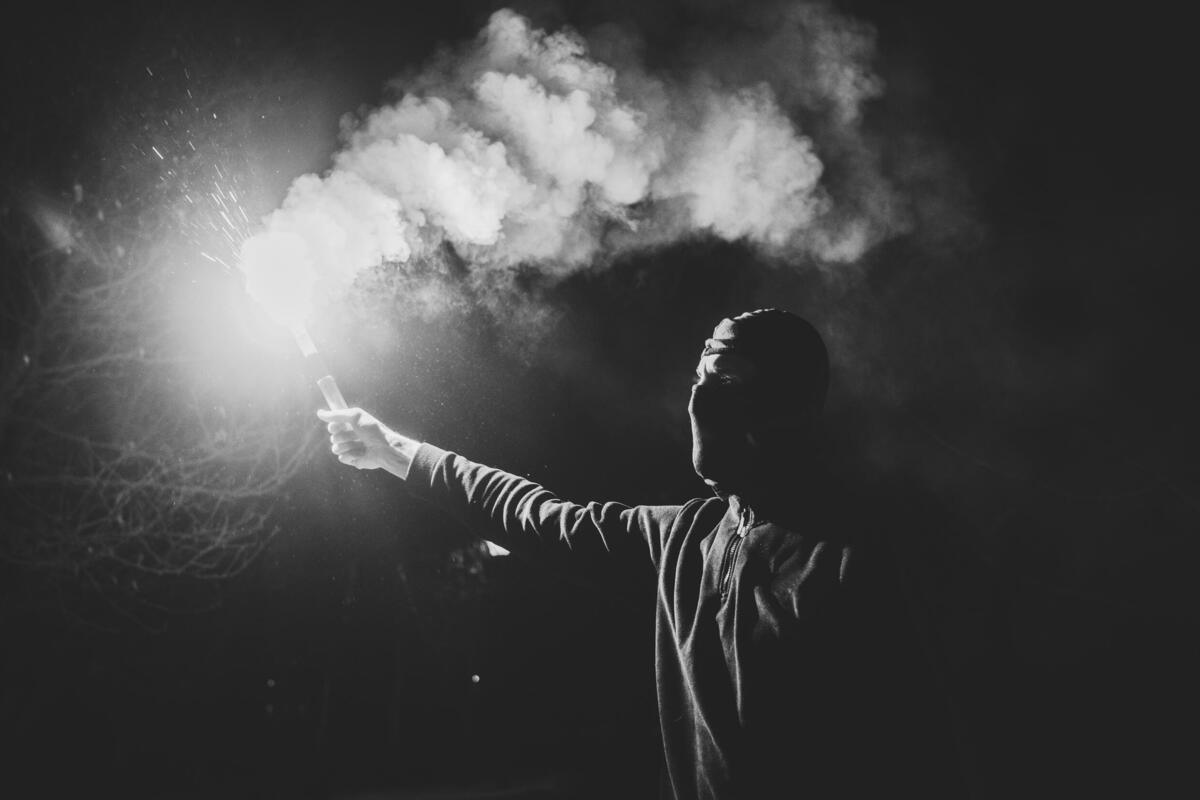It was a night full of diabolical symbolism in Croatia: while in the early evening hours (November 3rd) Zagreb’s political and social elite gathered in the wider city center to grace the opening ceremony of the second stage of the Croatian National Theater, HNK 2, in the wider center of Split, in the city district of Blatina-Škrapa, around fifty, mostly younger hooligans, allegedly members of the Torcida fan group, dressed in black, threatened violence and prevented the holding of a folklore and drama evening as part of the opening of the Days of Serbian Culture in Split.
While the elegant audience in Zagreb applauded the dance, drama and opera performances as part of the special program for the opening of the new stage of this “temple of Croatian culture”, in Split an aggressive mob, shouting the Ustasha salute “For the homeland, ready” and cursing “Serbian trash”, prevented the planned cultural and artistic program, dispersed the audience, and forced the performers, including those from Novi Sad, to seek safety by fleeing onto buses.
Earlier, according to witnesses, while a crowd dressed in black, some with masks on their faces, was creating a threatening scene in front of the entrance to the Gradski kotar hall, several of them entered the hall and, shouting and threatening, dispersed the crowd before the performance even began. They said that it was All Saints’ Day, so the event would desecrate the memory of the defenders, and that this was a sensitive month in which the victims of Vukovar are commemorated and commemorated.
After “negotiations” with the attackers, in which they agreed to allow people to leave the hall peacefully, the organizers canceled the event, and the guests from Novi Sad returned. According to the organizers, there were no physical injuries, and the police, according to their own statements, are “conducting an investigation.”
Responsibility lies at the top of the state
In his first reaction yesterday evening, Prime Minister Andrej Plenković wrote on his channel X that he “strongly condemns the incident” and expects the competent authorities to prosecute those responsible “as soon as possible.” “Exclusion or any form of intolerance towards national minorities has no place in Croatian society,” the Prime Minister wrote.
And at today’s (November 4) extraordinary press conference, he added that it was an “unfortunate incident” in which “members of the fan group obviously participated”. He also said that “there is no place for street law in Croatia”, and that such an act has nothing to do with protecting the dignity of war and veterans. In addition, Plenković emphasizes that his government does not tolerate revisionism and Ustashaism, and that he rejects such accusations.

Members of Torcida were involved in the incident.photo: Shutterstock
But Vesna Teršelić, head of Dokumenta – the Center for Dealing with the Past, sees responsibility for the creation of a climate conducive to xenophobia and aggressive exclusivity precisely in the political and social activities of some of the highest state representatives.
“It is painful to watch how the space for freedom is narrowing in Croatia. Yesterday’s attack is a serious additional warning that Croatia has not faced the past and that the institutions are currently unable, and I wonder whether they are willing, to guarantee the space for freedom, freedom of expression, creativity, media and scientific freedom to everyone living in the Republic of Croatia,” Teršelič told DW.
What is at work, as he adds, is a process of relativizing the past and the Ustasha symbol that has been going on for a long time, “but this latest period is the most problematic period so far. And I see the direct responsibility of the Prime Minister here.”
Croatia’s right turn
This incident in Split, however, did not come out of nowhere. Jurica Pavičić, a journalist and writer from that city, who has recently been the target of attacks by right-wingers for his critical and liberal views, points out in an interview with DW that the excesses in Split are just a piece in the mosaic of right-wing radicalization that has been taking place in Croatia particularly intensively since July and Thompson’s concert in Zagreb.
“There was a crowd of people and Ustasha and neo-Nazi iconography was very present. The until then moderately conservative government bowed down before that crowd. Plenković went to pay his respects to Thompson before the concert, four ministers were at the concert. The ruling HDZ tried to block off its right wing so as not to lose votes there. And that’s where the fire got out of control,” says Pavičić.
That concert was a kind of starting signal for the extreme right-wing position that is trying to completely dominate both political and social life. During the summer, there were several – successful and unsuccessful – actions by veterans’ associations to prevent a cultural festival that was foreign to them in terms of worldview, threats and hate slogans were written on the buildings where prominent writers Miljenko Jergović and Jurica Pavičić live, and a few days ago, a scandalous revisionist roundtable was organized in the Parliament on the topic of “Scientific Approach to Researching Jasenovac Victims” organized by the right-wing parties DOMiNO and Croatian Sovereignists. The basic thesis: Jasenovac was not a death camp at all, but a labor camp.
According to Jurica Pavičić, a clear social shift to the right has been visible for some time now, and a younger generation has come of age, which, as he says, was formed by extremely problematic Croatian institutions.
“The fans in the stadium stands or the skinheads are a smaller problem, and the bigger problem is that this atmosphere dominates the pillars of society, from the Croatian National Foundation to the Academy of Sciences and Arts, from the University to the State Prosecutor’s Office, including the Church, which is extremely revisionist in Croatia. Part of that picture are also veteran organizations that have turned into a bad copy of SUBNOR from the time of late socialism, when it was a retrograde brake on society,” our interlocutor believes.

Radicalization started with Thompson’s concertphoto: Shutterstock
Plenković’s incorrect assessment
At the same time, Pavičić adds, in his opinion, the Prime Minister himself is not the one who is actively working to affirm this atmosphere of intolerance and exclusivity. His responsibility lies primarily in inaction, in passivity. “I think he personally finds it disgusting, but there is a combination of opportunism, cowardice and the feeling that the entire political momentum has shifted to the right.”
This leads Plenković and those around him to passivity, which, Pavičić believes, is a miscalculation: “Any kind of right-wing populist revolution in Croatia cannot be complete without eliminating Plenković as a political factor. He is precisely the symbol of what they despise, but he does not act as if he understands this, but as if he is a threat to others.”
So far, expressions of intolerance and exclusion have mostly ended in threats and intimidation, but aggression and an atmosphere of violence are in the air. Speaking about the possibility of direct violence, Pavičić says: “Yes, it’s possible. It wouldn’t surprise me.”

News

